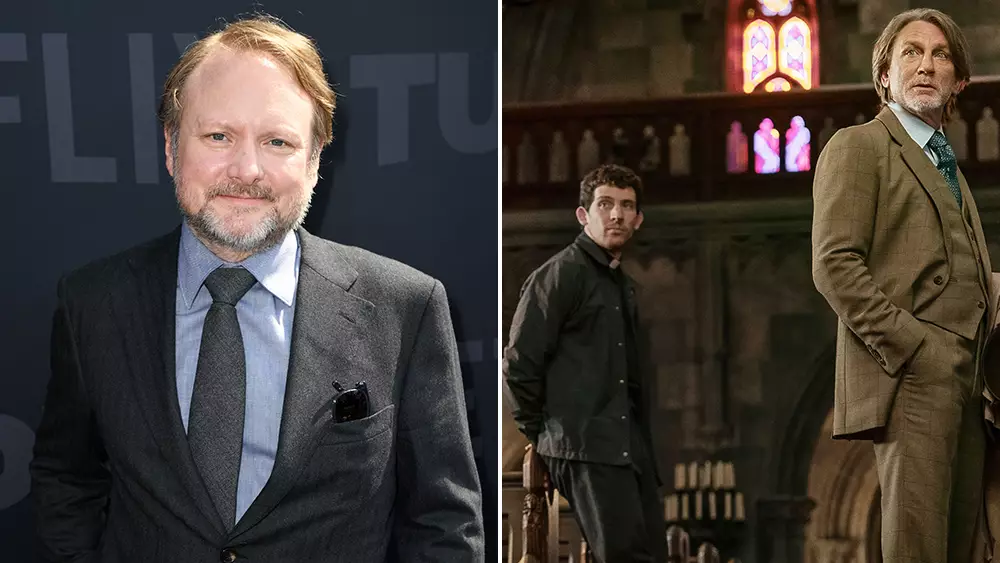Rian Johnson’s upcoming installment in the Knives Out universe, *Wake Up Dead Man*, signals a daring departure from recent stylistic experiments. The director openly embraces a nostalgic yet bold shift back to the genre’s origins—drawing inspiration not from modern mysteries but from the dark corridors of Gothic literature and Edgar Allan Poe. This is more than a mere tonal tweak; it’s a calculated risk that challenges the contemporary trend of lighthearted, self-aware whodunits. Johnson’s decision to evoke an older, more grounded tradition demonstrates a refusal to chase fleeting novelty at the expense of authentic narrative roots. His approach underscores a fundamental belief that true storytelling endures through emotional resonance and atmosphere—elements often marginalized in the glossy, cookie-cutter Hollywood productions.
The Gothic tone, grounded and haunting, contrasts sharply with *Glass Onion’s* playful, campy vibe. This deliberate shift suggests that Johnson isn’t content with predictable formulas—an admirable stance in an industry saturated with sequels that often feel like lazy reboots. Instead, he seeks to re-engage audiences with a genuine sense of unease that harkens back to the darker corners of literary history, believing that embracing the genre’s roots elevates the storytelling far beyond disposable entertainment. Such a move also indicates a confidence in the series’ potential for growth, not through superficial gimmicks, but through substantive, transformative risks.
Innovation Through Self-Disruption: Challenging Creative Comfort Zones
Johnson’s comments reflect a profound commitment to artistic integrity; he openly admits that repeating successful formulas is not only uninspiring but ultimately stifling to his creative spirit. His emphasis on “chasing the experience of each project” reveals a desire for new challenges—an essential trait for a filmmaker (or any artist) who refuses to rest on laurels. This reveals an underlying philosophical stance: growth demands discomfort, and stagnation is a slow death. To Johnson, each film represents a fresh gamble, a new puzzle where every decision might fail but offers a chance at genuine innovation.
In a broader sense, this reveals a moral stance against complacency in popular culture. The entertainment industry today is riddled with sequels, remakes, and reboots, often prioritized for commercial safety rather than artistic freshness. Johnson’s willingness to experiment—diving into Gothic, even Gothic horror, when most prefer to stay familiar—is a testament to a commitment to meaningful storytelling rather than pandering. It’s a counterpoint to the often toxic predictability that plagues mainstream media, emphasizing that creative integrity can serve as both artistic virtue and a way to genuinely surprise and move audiences.
Future Uncertainty: A Cautious Optimism for Continued Innovation
While Johnson remains open to further installments in the series, he underscores the importance of continual experimentation. His declaration that he “feels great” because each film is a “swing” he took not expecting it to work shows a refreshing stance toward risk. Unlike directors crippled by the fear of failure or the obsession with a permanent franchise identity, he is eager to keep pushing boundaries—even if doing so involves fundamentally altering the tone or genre each time.
This pragmatic ambiguity regarding future projects reflects a flexible, adaptive mindset. Johnson acknowledges that as soon as creators become comfortable, they risk becoming irrelevant. For him, the real danger lies in mastery turning into monotony, and every new movie becomes a conscious act of renewing excitement and purpose. His approach is a reminder that creative work is a continuous journey—one in which meaningful transformation often involves flirting with uncertainty and embracing unpredictability.
Implications for Genre and Audience Expectations
Ultimately, Johnson’s bold choice to revisit the Gothic genre with *Wake Up Dead Man* speaks to a larger cultural desire for authenticity in entertainment. In an era where mass-produced content often prioritizes artificiality and formulaic success, his willingness to chase after the raw, atmospheric power of Poe and classic horror underscores a longing for stories that resonate deeply and evoke real emotional responses. It challenges the audience to look beyond surface-level pleasures and engage with mysteries that probe the human psyche and our shared fears.
This shift also calls into question the industry’s obsession with branding and franchise fatigue. Johnson’s stance suggests that true innovation requires breaking free from the shackles of audience expectations and industry trends. For viewers who are tired of the same old mystery tropes, his risk represents a breath of fresh air—a reminder that storytelling, at its best, is an act of rebellion against mediocrity. The gamble on Gothic, atmospheric storytelling is a testament to the resilience of genuine craft and the belief that meaningful art can—and should—be provocative, challenging, and deeply rooted in tradition.


Leave a Reply